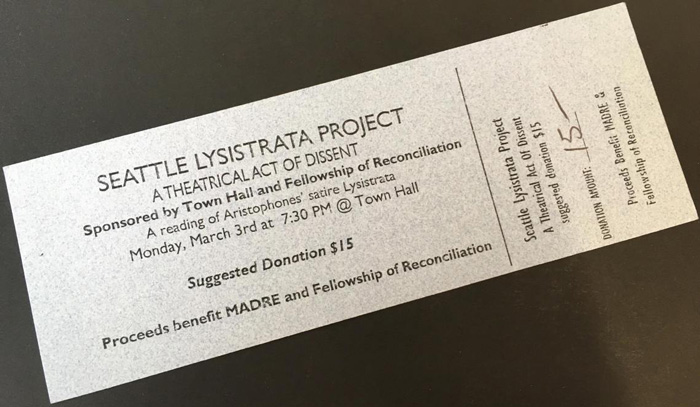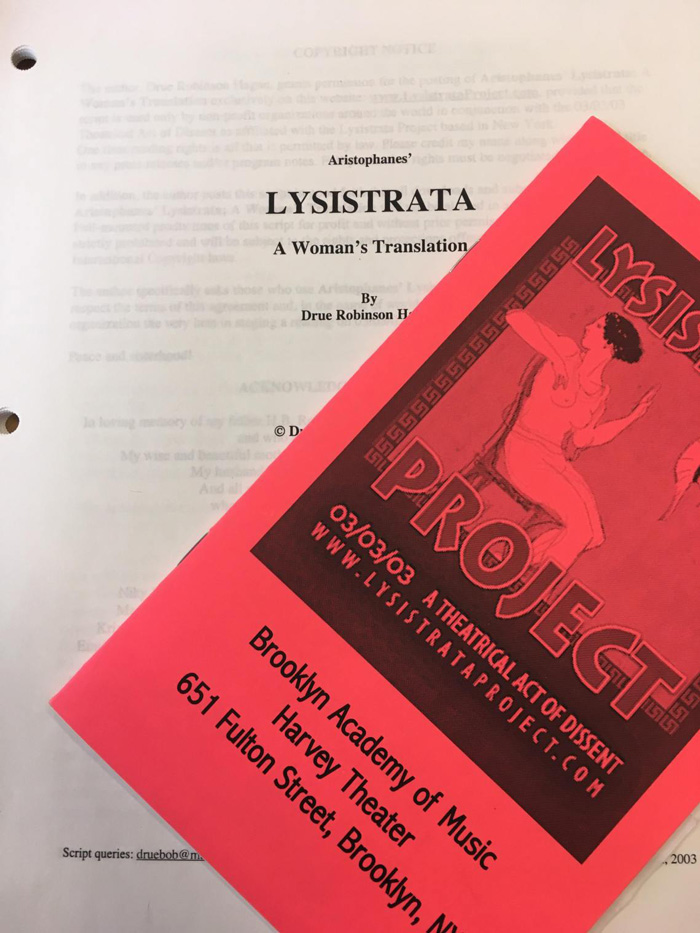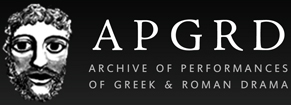The Archive in 100 Objects
 In this series researchers explore the larger stories told by single objects in the archive. In this post, Alison Middleton (University of Oxford Masters student) reveals the story behind a ticket to a worldwide performance of Aristophanes' Lysistrata in March 2003.
In this series researchers explore the larger stories told by single objects in the archive. In this post, Alison Middleton (University of Oxford Masters student) reveals the story behind a ticket to a worldwide performance of Aristophanes' Lysistrata in March 2003.

In 2003, New York actors Kathryn Blume and Sharron Bower organised a global reading of Aristophanes’ comedy Lysistrata to raise money for humanitarian organisations working in Iraq. Their idea sparked a worldwide phenomenon: on the 3 March 2003, 1029 readings of Lysistrata, dubbed The Lysistrata Project, took place across 59 different countries to protest against the Iraq War. This ticket is from of one of the many readings that took place in the USA, staged publicly in the Seattle Town Hall. In place of the ticket price is a suggested donation, testament to the charitable nature of these events. The readings were not only organised to raise awareness and demonstrate discontent, but they also financially benefited various anti-war charities. This particular production donated to MADRE (a charity for global women’s rights) and Fellowship of Reconciliation (an international movement for nonviolence) – particularly apt given the topic of Lysistrata.
So why did this group of protestors decide to stage Lysistrata? In this bawdy comedy, the women of Athens and Sparta begin a sex strike, refusing to engage in any intimacy with their husbands, and simultaneously taking over the funds held at Athens’ Acropolis. The women gain total control over the men of the play, besting and teasing them at every opportunity in a variety of hilarious scenarios, often very reminiscent of carry-on films. The women’s total sexual and financial control strongly contrasts with the restraints put on real Athenian women, who were encouraged not to be seen in public, let alone casually swear and strip off as these female characters do.
 Right: Publicity image for The Lysistrata Project, London; photo: Nicky Dunsire
Right: Publicity image for The Lysistrata Project, London; photo: Nicky Dunsire
Although part of the joke for Aristophanes’ audience was doubtless that the female characters were so outrageously badly behaved, Lysistrata’s depiction of female power has led it tobecome an important modern-day feminist text. It was produced in the same year as Aristophanes’ Thesmophoriazusae, a play in which a man transgresses into the female-only space of the Athenian Thesmophoria festival. But Lysistrata has totally eclipsed its contemporary: by 2009, Lysistrata had been performed more times than Aristophanes’ other three most famous plays (Birds, Frogs and Clouds) combined, according to the APGRD production database. It has also inspired multiple adaptations throughout history, including John Fletcher’s Jacobean comedy The Tamer Tamed (1611) written in response to Shakespeare’s Taming of the Shrew. This particular comedy of Aristophanes’ has been used to explore relationships between the sexes in relation to issues of consent and power, and has been understood to have a pacifist message too.
Scholars of Aristophanes’ ancient text stress, however, that Lysistrata’s message is specifically against the Peloponnesian war, fought between the Athenians and the Spartans in 431-403 BCE. The play is not anti-war in general, and this ambiguity is reflected even in the character Lysistrata’s name (Λυσιστράτη). Deriving from λύσις (lusis: releasing / scattering) and στρατός (stratos: army), it can have both the threatening meaning ‘she who scatters armies’, and the more peaceful ‘she who releases’ them. Although Aristophanes’ normalisation and acceptance of war jars with a modern audience, the women’s dedication to peace is evident throughout the play: their strike will not end until the war between the Athenians and Spartans is resolved.
In reality, a positive reconciliation for Athens was looking rather unlikely by the time Aristophanes wrote the play. Athens had recently suffered a serious defeat in their expedition to Sicily, and as a result a Spartan victory seemed imminent. The peace treaty that comes at the end of Lysistratais undoubtedly fantastical, but Aristophanes still chose to stage this optimistic and riotous comedy at such a low point of the war for Athens. Aristophanes’ Lysistrata not only depicts ordinarily voiceless people instigating change; it is itself a utopian artistic projection of a politically impossible peace. This makes the play all the more poignant for a modern audience who are disenfranchised, and who feel that their governments are making negative decisions on their behalf.
 Programme and script for 'The Lysistrata Project'. APGRD collections. Photograph: APGRD
Programme and script for 'The Lysistrata Project'. APGRD collections. Photograph: APGRD
And so, out of discontent about the Iraq War, The Lysistrata Project was born. Many of the readings blurred the lines between acts of theatre and acts of protest: one UK group wore Greek style masks and staged a three-minute silence in Parliament Square, before reading an extract from the play. Not all of the productions, however, could afford to be so public. Some readings in politically unstable countries had to happen in private to avoid danger: for example, a group of international journalists staged a reading in Iraq, but their names and location have had to remain anonymous.
These individual and private readings, in addition to the public events, equally reflect the main aim of the project: protest. The subtitle on the ticket describes the event as ‘A THEATRICAL ACT OF DISSENT’, and the project has been portrayed by the BBC as ‘the biggest act of dissent ever made in the theatre world’. This use of theatre as a simultaneous means of public protest and individual display of discontent allowed for a wider participation, inviting those who might otherwise feel voiceless to join the movement. The ticket encourages us to think about the audience member who attended the event: did the project empower them? Did this ancient play highlight the tragic inevitability of war? Or did it show the resilience of dissenting individuals and the power of protest? In theatre, as in protest, the individuals who turn up and listen can make a difference as much as those who take part. If they want to implement change, artists always need an audience.
Find out more
- About Alison Middleton
- See The Lysistrata Project's original website
- Read more about the power of bodies on stage in Stephe Harrop's An introduction to... the tragic body

